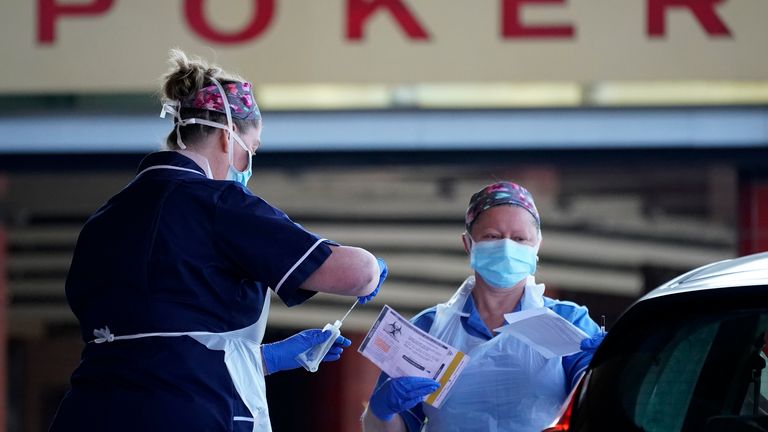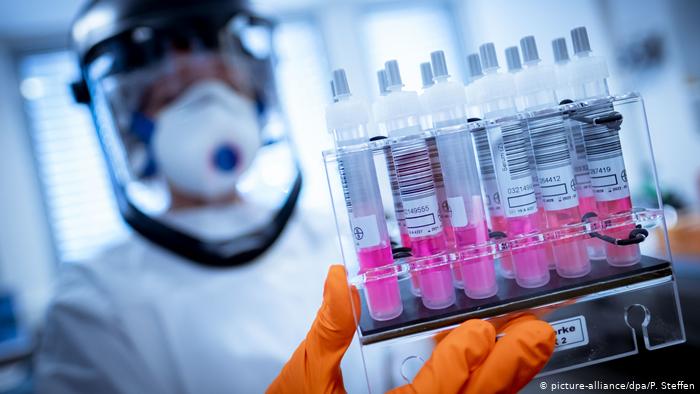The government's scientific advisory group earlier said mass testing could lead to a large number of false-positive results.
The mass testing programme would cost £100bn - almost as much as the government spends on the NHS each year (£130bn) - according to a briefing memo seen by the medical journal The BMJ.
Leaked documents reportedly show the government plans to carry out up to 10 million coronavirus tests a day by early next year, but critics say the proposals represent "waste/corruption on a cosmic scale".
A separate document revealed there were plans to grow the UK's testing capacity from the current 350,000 a day to up to 10 million a day by early 2021.
On Wednesday, Prime Minister Boris Johnson announced ambitious plans for millions of people to be tested for coronavirus every day, in what he characterised as the "Moonshot approach".
Moonshine: "Operation Moonshot" is the UK PM Boris Johnson's latest gimmick for coronavirus testing - millions of tests with results in minutes; except there is a lack of laboratory capacity and technology for more rapid tests "does not, as yet, exist"https://t.co/RqQB2ZaePS
— Prem Sikka (@premnsikka) September 10, 2020
These documents provide more detail on what the government hopes to achieve, including plans for private companies GSK, AstraZeneca, Serco and G4S to help carry out the proposals.
But some scientists have already expressed doubts, while a memo published by the government's scientific advisory group (SAGE) last week warned mass testing could lead to an increased number of false positive results.
Anthony Costello, a former World Health Organisation director and UCL professor, wrote on Twitter: "The PMs Moonshot nonsense (no science, feasibility, evidence) has been earmarked for £100bn, almost the entire NHS budget, w contracts for Astra, Serco and G4S.
"This is waste/corruption on a cosmic scale."
Others pointed out current problems with the existing test and trace programme after people complained of having to travel hundreds of miles from home to take a test.
I'm sensing widespread incredulity & shock at the messaging from Downing Street. This is an existential moment for the UK. Will the government deliberately act in a way that makes the country a pariah state? I fear it might. The seriousness of this simply cannot be overstated
— Martin McKee (@martinmckee) September 6, 2020
"This plan transmits unbounded optimism, disregarding the enormous problems with the existing testing and tracing programmes," Martin McKee, professor of European public health at the London School of Hygiene and Tropical Medicine, told The BMJ.
"It focuses on only one part of the problem, testing, and says nothing about what will happen to those found positive, a particular concern given the low proportion of those who do adhere to advice to isolate - in part because of the lack of support they are offered."
He added: "On the basis of what is presented here, this looks less like Apollo 11, which took Neil Armstrong to the moon successfully, and more like Apollo 13."
Professor Jose Vazquez-Boland, chairman of infectious diseases, University of Edinburgh, was more optimistic about the plans.
"The focus of testing currently remains on confirmation of suspected cases (people with symptoms), thus missing the point that most community transmission comes from those who are asymptomatic," he said.
Government to give £100 BILLION (!) to private sector pals for 'Operation Moonshot' testing plans. As @martinmckee comments, given this lot's track record, it will be less Apollo 11 (which landed a man on the moon) than Apollo 13 (aborted after two days): https://t.co/NzcRDejmj8
— Stephen Reicher (@ReicherStephen) September 9, 2020
"Only a mass screening programme, such as this alternative plan announced by the prime minister, which involves the regular testing of all the population for asymptomatic transmitters, can keep COVID-19 under control and eventually lead to its eradication."
In a document published on Friday, SAGE said the cheaper and faster tests needed for mass testing were less likely to be able to correctly identify positive and negatives than the tests currently used by NHS Test and Trace.
It said that in a population with low infections, twice-weekly tests with 99% specificity would lead to 41% of the population receiving a false positive over six months.

"In such circumstances, rapid follow-up confirmatory testing will be needed to determine whether individuals should continue to self-isolate - it is important to rapidly isolate infectious individuals, but efforts will be needed to quickly release false positives," it said.
But the committee did say using testing as a point-of-entry requirements for particular settings, such as sporting events, could help these activities resume with a reduced risk of transmission, but would "require superb organisation and logistics with rapid, highly-sensitive tests".
Under the plans, the Whitehall briefing memo says testing will be rolled out in workplaces, football stadiums, entertainment venues and also at GP surgeries, pharmacies, schools and other local sites.
People will be given digital immunity passports that would allow those who test negative to take part in more normal activities.
Those in high-risk occupations or who are more vulnerable - such as hospital staff, ethnic minority groups and teachers - would be prioritised for regular testing.
Favourite quote of the day so far, from BBC News daily email:
— Nicki Clarkson (@Nicki_SotonLib) September 10, 2020
‘The mass-testing strategy is fundamentally flawed, in that it is being based on technology that does not, as yet, exist," says Dr David Strain, of the University of Exeter.’
The government is banking on technology that "currently does not exist", the briefing memo says, including a rapid 20-minute saliva test being piloted in Salford, Greater Manchester.
Dr David Strain, a clinical senior lecturer at the University of Exeter and chairman of the BMA's medical academic staff committee, said this means the mass testing strategy is "fundamentally flawed".
"The prime minister's suggestion that this will be as simple as 'getting a pregnancy test' that will give results within 15 minutes is unlikely, if not impossible, in the timescale he was suggesting to get the country back on track," he said.
Latest Stories
-
CHAN 2024Q: Ghana’s Black Galaxies held by Nigeria in first-leg tie
19 minutes -
Dr Nduom hopeful defunct GN bank will be restored under Mahama administration
53 minutes -
Bridget Bonnie celebrates NDC Victory, champions hope for women and youth
1 hour -
Shamima Muslim urges youth to lead Ghana’s renewal at 18Plus4NDC anniversary
2 hours -
Akufo-Addo condemns post-election violence, blames NDC
2 hours -
DAMC, Free Food Company, to distribute 10,000 packs of food to street kids
3 hours -
Kwame Boafo Akuffo: Court ruling on re-collation flawed
4 hours -
Samuel Yaw Adusei: The strategist behind NDC’s electoral security in Ashanti region
4 hours -
I’m confident posterity will judge my performance well – Akufo-Addo
4 hours -
Syria’s minorities seek security as country charts new future
5 hours -
Prof. Nana Aba Appiah Amfo re-appointed as Vice-Chancellor of the University of Ghana
5 hours -
German police probe market attack security and warnings
5 hours -
Grief and anger in Magdeburg after Christmas market attack
5 hours -
Baltasar Coin becomes first Ghanaian meme coin to hit DEX Screener at $100K market cap
6 hours -
EC blames re-collation of disputed results on widespread lawlessness by party supporters
6 hours

